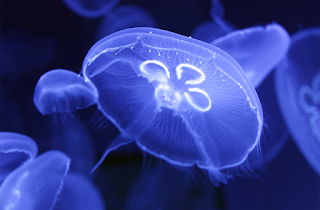Aloha Jellyfish Friday!
Jellyfish consist of about 95 percent water, and are not
actually fish, since they are invertebrates that don't have any
bones. They have a nerve network, but no central nervous system
or brains, nor a circulatory system or respiratory system.
Jellyfish stomachs are found in their umbrella-shaped bodies,
which are known as bells, and jellyfish have tentacles with
cnidocytes, a type of exploding cell. Found in oceans around the
world, most jellyfish eat plankton, fish larvae, and fish eggs,
and are eaten by the likes of sharks, sea turtles, dolphins, and
tuna and other fish.
Second
snow crab season canceled as researchers pinpoint cause
The precipitous drop of Alaskan snow crab populations by 90% to
only one billion currently is attributed to warming ocean
temperatures caused by climate change.
Cigarette
butts remain Vancouver's most littered item — and a
seemingly unsolvable waste problem
cigarette butts are still the No. 1 most littered item in
Vancouver, where several education and mitigation programs over
the years — including the threat of up to $10,000 in fines —
have done little to make it socially unacceptable to discard
them in the street.
Conservationists
fail in push to tighten WA wolf killing rules
The Washington Fish and Wildlife Commission rejected a petition
to update rules around when the state authorizes lethal action
against wolves that attack livestock.
Despite
opposition and environmental violations, major B.C. pipeline
project nearly complete
TC Energy says the 670-km Coastal GasLink pipeline has been
fully installed from Dawson Creek to Kitimat.
Lower Snake River dam removal still possible as talks continue
Dam removal on the Lower Snake River is still on the table as talks
continue over salmon survival and the operation of dams in the Columbia
Basin.
Capturing Carbon with Seaweed: What We Know, What We Don’t, and What We’re Totally Unsure About
Towering underwater kelp forests are often likened to trees, but seaweed
carbon sequestration is far more complex than in soil-bound ecosystems.
Protection of B.C.'s marbled murrelet reaches federal court
A federal order to protect marbled murrelet nests — along with 24 other
migratory bird species — failed to protect wider habitat they need to
survive, hears justice.
Birds in the Americas Will No Longer Be Named After People
The American Ornithological Society has committed to replacing all bird
names derived from people so as not to honor figures with racist pasts.
These news clips are a selection of weekday clips collected in
Salish Sea News and Weather which
is compiled as a community service by Mike Sato. To subscribe at
no cost to the weekday news clips, send your name and email to
mikesato772 at gmail.com. Your email information is never shared
and you can unsubscribe at any time.
Salish Sea News: Communicate, Educate, Advocate
Salish Sea Communications: Truth
Well Told

No comments:
Post a Comment
Note: Only a member of this blog may post a comment.